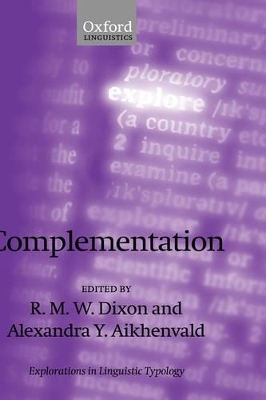
Complementation
Oxford University Press (Verlag)
978-0-19-929787-0 (ISBN)
A complement clause is used instead of a noun phrase; for example one can say either I heard [the result] or I heard [that England beat France]. Languages differ in the grammatical properties of complement clauses, and the types of verbs which take them. Some languages lack a complement clause construction but instead employ other construction types to achieve similar ends; these are called complementation strategies. The book explores the variety of types of complementation found across the languages of the world, their grammatical properties and meanings. Detailed studies of particular languages, including Akkadian, Israeli, Jarawara, and Pennsylvania German, are framed by R. M. W. Dixon's introduction, which sets out the range of issues, and his conclusion, which draws together the evidence and the arguments. This book will interest scholars of typology, language universals, syntax, information structure, and language contact in departments of linguistics and anthropology, as well as advanced and graduate students taking courses in these subjects.
R.M.W. Dixon is Professor and Director of the Research Centre for Linguistic Typology at La Trobe University. He has published grammars of a number of Australian languages (including Dyirbal and Yidiñ), in addition to A Grammar of Boumaa Fijian (University of Chicago Press 1988), A New Approach to English Grammar, on Semantic Principles (OUP 1991), revised as A Semantic Approach to English Grammar (OUP 2005), and The Jarawara Language of Southern Amazonia (Oxford UP 2004). His works on typological theory include Where have all the Adjectives Gone? and other Essays in Semantics and Syntax (1982) and Ergativity (1994). The Rise and Fall of Languages (1997) expounded a punctuated equilibrium model for language development; this is the basis for his detailed case study Australian Languages: Their Nature and Development (2002). Alexandra Y. Aikhenvald is Professor and Associate Director of the Research Centre for Linguistic Typology at La Trobe University. She has worked on descriptive and historical aspects of Berber languages and has published, in Russian, a grammar of Modern Hebrew (1990). She is a major authority on languages of the Arawak family, from northern Amazonia, and has written grammars of Bare (1995, based on work with the last speaker who has since died) and Warekena (1998), plus A Grammar of Tariana, from Northwest Amazonia (Cambridge University Press 2003), in addition to essays on various typological and areal features of South American languages. Her books, Classifiers: a typology of noun categorization devices (2000, paperback reissue 2003), Language contact in Amazonia (2002) and Evidentiality (2004) were published by Oxford University Press. She is currently working on a reference grammar of Manambu, from the Sepik area of New Guinea.
1. Complement Clause Types and Complementation Strategies in Typological Perspective ; 2. Complement Clause Types in Pennsylania German ; 3. Complement Clause Types in Israeli ; 4. Complement Clause Type and Complementation Strategy in Jarawara ; 5. Complement Clause Types and Complementation Strategy in White Hmong ; 6. Complement Clause Types and Complementation Strategy in Dolakha Newar ; 7. Complement Clause Types and Complementation Strategies in Akkadian ; 8. Complement Clause Types and Complementation Strategies in Tariana ; 9. Complement Clause Type and Complementation Strategies in Goemai ; 10. Complement Clause Type and Complementation Strategies in Matses ; 11. Complement Clause TYpe and Complementation Strategy in Kambera ; 12. Complementation Strategies in Dyirbal
| Erscheint lt. Verlag | 1.8.2006 |
|---|---|
| Reihe/Serie | Explorations in Linguistic Typology ; 3 |
| Verlagsort | Oxford |
| Sprache | englisch |
| Maße | 162 x 242 mm |
| Gewicht | 594 g |
| Themenwelt | Geisteswissenschaften ► Philosophie ► Sprachphilosophie |
| Geisteswissenschaften ► Sprach- / Literaturwissenschaft ► Sprachwissenschaft | |
| Sozialwissenschaften ► Soziologie | |
| ISBN-10 | 0-19-929787-8 / 0199297878 |
| ISBN-13 | 978-0-19-929787-0 / 9780199297870 |
| Zustand | Neuware |
| Haben Sie eine Frage zum Produkt? |
aus dem Bereich


